Jun 19, 2025 – Day 2 of JTS Workshop in Trongsa, Bhutan
Hello. Today, Sunim will conclude the sustainable development workshop in Trongsa, Bhutan, and move to Zhemgang.
On a drizzly morning, with thick fog blanketing the mountain slopes of Trongsa, a new day began. After completing his morning practice, Sunim had fried rice and kimchi for breakfast.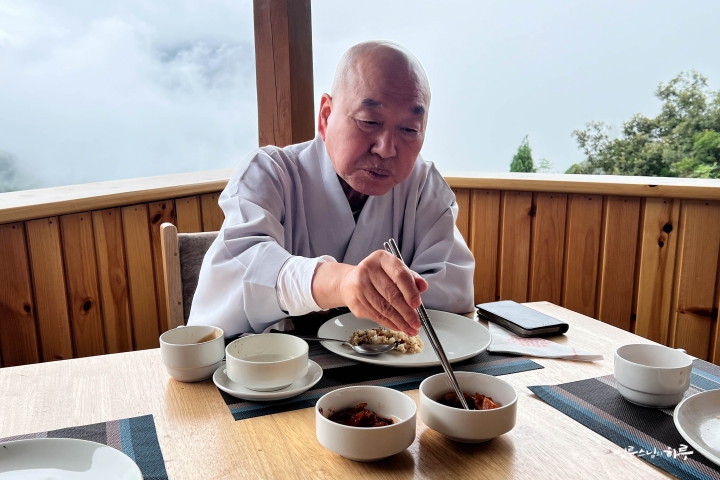
At 9 AM, the workshop resumed. Continuing from yesterday, representatives from each gewog presented their 2025 village development plans. The gewog representatives spoke with noticeably more confidence than the day before, and participants listened attentively to each other’s plans with calm focus. Through Rinchen’s interpretation, Sunim was able to understand the presentations in real-time.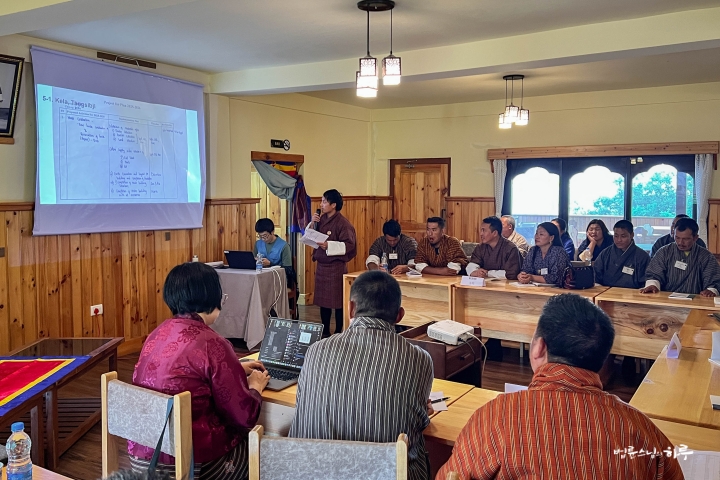
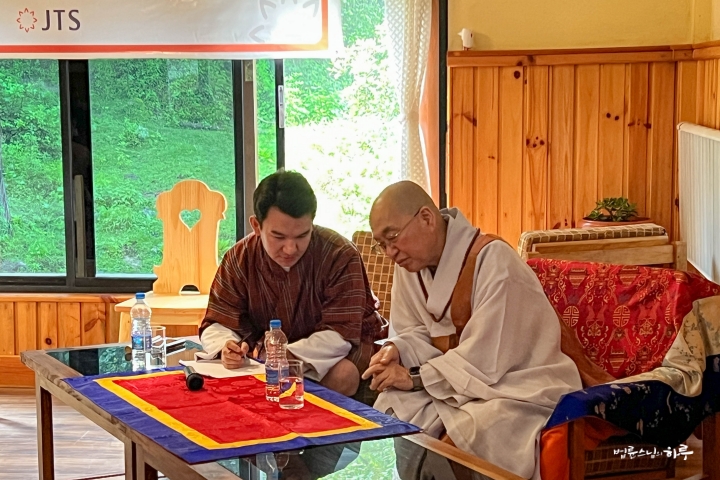
After all presentations were completed, Sunim gave his closing remarks.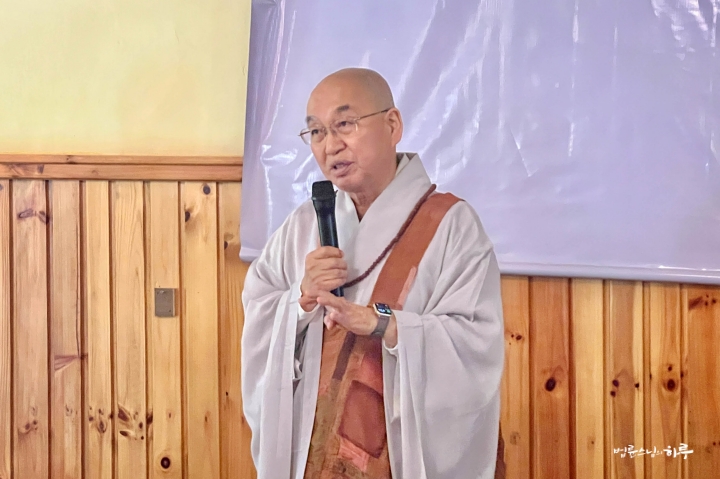
“The purpose of this project is to improve the lives of village residents. If you participate with a spirit of service, it will be a great help in creating better communities to live in.
First, building new houses or repairing existing ones is originally the responsibility of individual residents or village communities. However, there are many houses that need improvement but cannot be addressed because individuals or villages lack the funds. Therefore, JTS wants to support materials so that residents can repair their houses themselves.
Second, paving roads, building bridges, and bringing in water supplies are projects that should be undertaken by the government. However, due to limited government budgets, you would have to wait a long time for the government to do these things. While waiting is one option, if villagers are willing to tackle urgent needs first with material support, JTS can provide those materials.
Why We Help People Instead of Building Temples
You might be curious about where JTS’s funding comes from. This money is neither from the Korean government nor sponsored by Korean corporations. It comes from donations collected from ordinary individuals like yourselves, contributing $10 or $20 each. Many temples in Korea use donations to build temple buildings. However, JTS thinks differently.
‘What is Buddha? Buddha is not a stone statue, nor someone residing in heaven. When a person is ignorant, we call them a sentient being; when enlightened, we call them Buddha. Therefore, people are Buddha. So helping those in difficulty is the same as making offerings to Buddha. Let us no longer call building structures, erecting pagodas, or making Buddha statues Buddhist work. Instead, let us call helping those in need true Buddhist work.’
This is the spirit of JTS. That’s why JTS donations go to those who truly need help, those who need it most. If I were building a temple or erecting a pagoda, I would personally check the progress multiple times. Since we’re pursuing this project with the same mindset, I have visited Bhutan eleven times so far, checking every detail. We also maintain trust by explaining exactly how the donations were used to those who contributed. 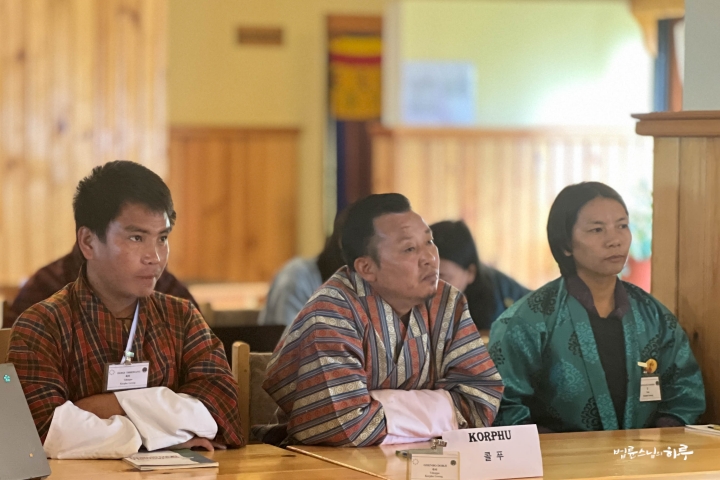
First, this money is like temple construction funds and must never be wasted. Second, it should be used generously where truly necessary. While government budgets are spent if there’s a surplus and projects are halted if there’s a shortage, JTS donations can be redirected if there’s a surplus and additional funds can be requested if there’s a shortage. You must use the funds precisely where needed with the mindset of ‘How would I spend this if it were my own money?’ For example, when building a house, it must be sturdy, so you need to use quality materials for cement, sand, and gravel. However, for road paving, it’s fine to use stones broken from the mountains or sand collected from the riverbank. If sand and gravel aren’t available, you’ll have to purchase them, but if they can be sourced locally, it’s best to maximize the use of surrounding resources.
How Do We Balance Fairness in Distribution with Exceptional Support?
Even though we’re doing this work to help residents, they may still have complaints. This happens when things feel unbalanced or unfair. For example, if our village broke stones from the mountain and collected sand from the river to save money, but the neighboring village paid for all their gravel and sand, villagers might express dissatisfaction. However, not all villages can be exactly the same. Such differences need to be fully explained to residents so they can understand and accept them.
The same applies when building houses. Some houses only need roof support, while others need both roofing and cement, and still others may need money for lumber as well. Particularly for very poor households, even with help from neighbors, they may need to hire a carpenter for several days. In villages like Jangbi Chiwog, there might not be anyone who knows how to build houses at all. In such cases, after discussion, carpenters need to be provided for several days. Then other villages might complain, ‘JTS provided carpenters for Jangbi Chiwog, why not for us?’ If handled poorly, the Tshogpa ends up taking unnecessary blame. In these situations, it’s essential to fully explain to residents that support was provided only as an exception where absolutely necessary. Also, when more materials are provided to certain houses, people might ask, ‘Why does that house get more while we get less?’ In such cases, you need to specifically explain what circumstances required that house to receive more support so people can understand.
The hardest thing in the world is giving things away for free. It’s easy for me to get free money from others, but giving is much harder. For example, let’s say three people live in one house and five in another. If you distribute equally by household, the house with five people might complain, ‘We have more people, why do we get the same amount?’ But if you distribute by the number of people, then other houses will raise issues asking, ‘Why does that house get more?’ Complaints arise depending on what and how you distribute, which is why free distribution is always difficult.
JTS projects inevitably face these issues. Basically, JTS’s principle is not to provide carpenters or technicians. If carpenters or technicians are truly necessary, the government office should set up a separate budget for it. If labor costs need to be used from the JTS budget, approval from the steering committee is mandatory. Since these labor costs are exceptional, you must clearly explain why they’re absolutely necessary. Some work might also require an excavator. In that case too, the government office should budget for it. JTS’s principle is to support only activities in which residents directly participate. Of course, there can be exceptions in life. But Tshogpas and Gups need to fully understand that such exceptions are allowed only in very special cases. If residents misunderstand and complaints arise, JTS staff will go directly to the villages to explain to residents. This is because you shouldn’t be misunderstood and criticized while doing good work.
If You Keep at It for Just Three Years, Village Life Will Become Much More Convenient
With this approach, first, let’s try to make our village a bit cleaner. This isn’t something someone else does for us; it’s something we do ourselves. JTS will provide the materials needed for this work. Even though we may not live as well as in Thimphu, living in the countryside doesn’t mean we have to live in squalor. The idea is to live in a neat and organized way.
Second is the irrigation channel issue. Currently, water travels 3 to 5 kilometers from the water source to the fields, resulting in significant water loss. This section is difficult for residents to handle, so it’s a project the government should undertake. However, even after water reaches the fields, much is still lost as it flows between paddies. This part isn’t covered by the government, so residents must improve it themselves. Therefore, irrigation channel repairs should be conducted only in sections with severe water loss. Areas without significant loss don’t need work. From what I can see, this work is quite challenging because there are no farm roads between the paddies. If there were farm roads, channels could be built alongside them, but now materials must be carried over long distances. So it’s best to proceed minimally only where absolutely necessary. Also, it’s difficult to construct all sections with cement. Steep slopes have little water loss because water flows quickly, but flat areas where water flows slowly have significant loss and definitely need cement channels. 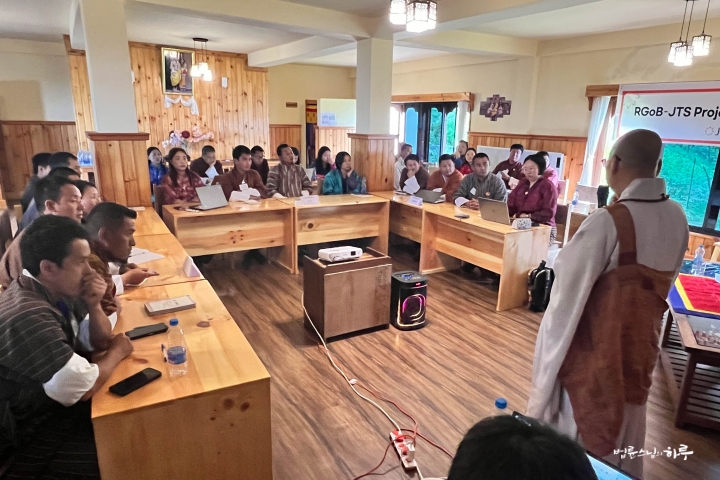
Third is road repair. While road maintenance is fundamentally a government project, waiting for the budget takes too long. So we decided to repair the most urgent areas ourselves first. From what I’ve observed, three sections are particularly problematic. The first section has slopes that are too steep for vehicles to climb. It becomes even more difficult when it rains. The second section becomes muddy when it rains, causing vehicles to get stuck. These areas can be improved simply by filling them with stones. The third section is where water flows across the road, continuously eroding it. In these areas, we can either bury pipes underground to redirect the water flow or use cement to create channels that allow vehicles to pass while guiding the water flow. This way, vehicles can pass even when it rains. If we repair just five 20-meter sections out of a 5-kilometer road, vehicles can travel without major obstacles. If we continue this work steadily for about three years, I believe village life will become much more convenient.
In my view, this work should be completed during the agricultural off-season, from November to April each year. From May to October is the busy farming season when residents are occupied with agricultural work. Also, materials must be prepared in advance. Since we’re not hiring paid laborers, if we take a break during work, all the residents will leave. It’s difficult to gather them again. During our pilot project, when we ran out of materials mid-construction, it took time to procure more materials, and in the meantime, all the residents had gone home. Even when the materials arrived, we couldn’t continue construction because people wouldn’t gather again. That’s why it’s important for the Gup, Tshogpa, and administrative officers to plan well together. Please keep in mind how important your roles are.”
After Sunim finished speaking, they shared a cup of tea, and then a Q&A session began at 10:30 AM. First, the Gup of Tangsibji Gewog took the microphone and shared his thoughts.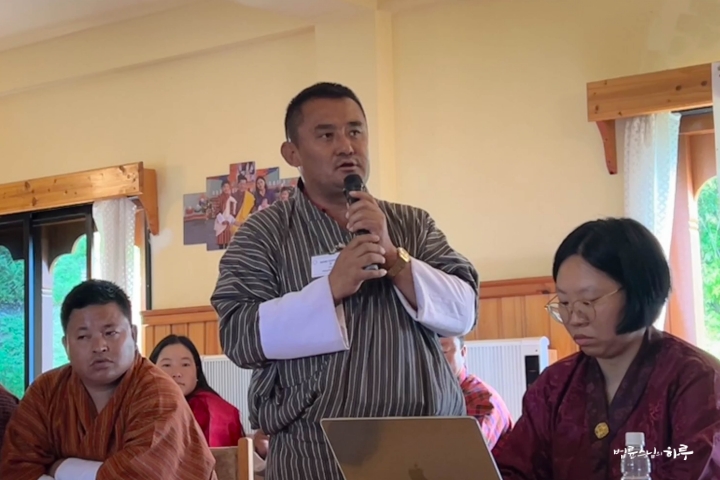
There are cases where people have transferred their houses to their children and become homeless themselves. While this may seem like a simple issue, there are often complex circumstances involving family conflicts. We would appreciate it if you could consider these situations as well.
Even where water supply facilities exist, many 30-40 year old facilities have broken parts. They may look fine on the outside but don’t actually function, so we hope you’ll consider supporting these areas next year.
Even if only the roof is problematic and the house appears to be in good condition, many households are actually too poor to make repairs. We hope you’ll consider not just the external appearance but also the actual circumstances.
We heard that gravel and sand were supported during the pilot project but will be excluded from the main project. Please confirm if this is true.
When building houses, we’re curious if we must follow JTS’s basic design even when receiving only 50% support. It would be nice to have some autonomy.
Sunim answered each question in detail and accepted all the suggestions. After the Q&A session, Sunim gave words of encouragement to the civil servants.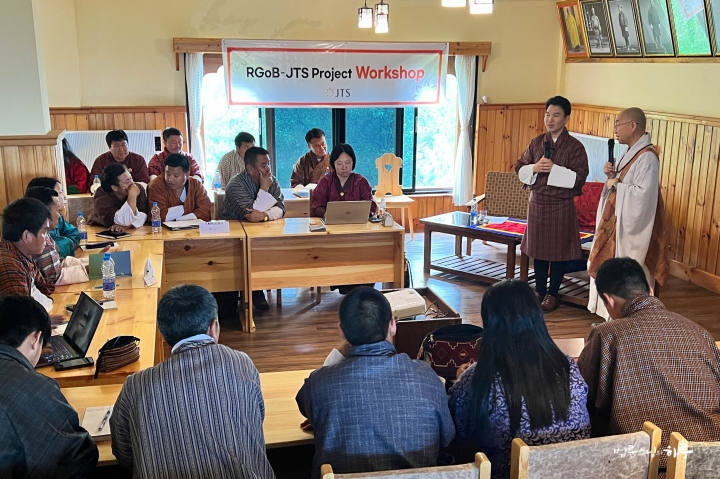
“Since we’ve gathered like this, let’s recite one of Buddha’s teachings before we conclude. You’ve heard of the term ‘Pure Land’ (淨土), right? It means the ideal nation in Buddhism, the Buddha’s land. And you know the term ‘Bodhisattva,’ right? It means a practitioner. Practitioners in Theravada Buddhism are called bhikkhus, while practitioners in Mahayana Buddhism are called Bodhisattvas. In Theravada Buddhism, only ordained monks are considered practitioners, but Bodhisattvas in Mahayana Buddhism include both ordained and lay practitioners. 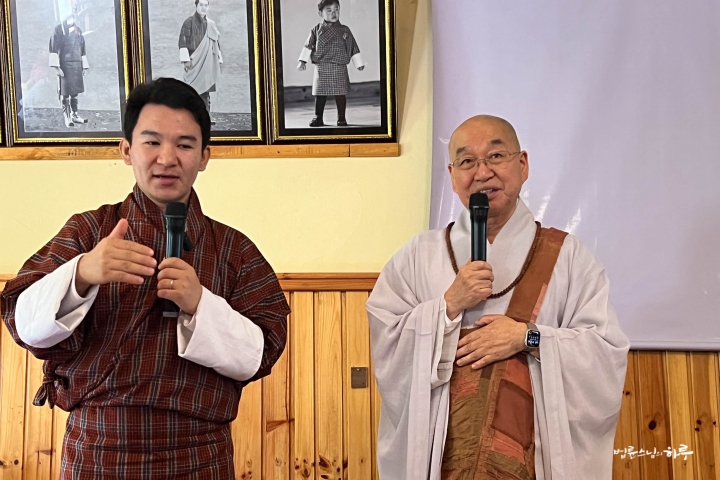
The Process Itself Is Happiness
In the Avatamsaka Sutra, it says, ‘For a Bodhisattva, the Pure Land is not an already completed world, but a world where the Bodhisattva acts toward completion.’ For example, we set a goal to beautify our village and think it becomes a Pure Land when that work is completed. However, for practitioners, the Pure Land has a different meaning. When I am working toward completion, the Pure Land has already been realized in my heart. This means that when we generate the aspiration and practice toward an ideal, we are already living as if we have reached that ideal world. The outwardly manifested completed world is called ‘Pure Land in Other Realms’ (他方淨土), saying ‘the Pure Land exists somewhere over there.’ However, the Pure Land formed in my heart is ‘Mind-Only Pure Land’ (唯心淨土). If a Bodhisattva is acting to create the Pure Land in Other Realms, we can say that the Mind-Only Pure Land has already been realized. Bodhisattvas don’t consider only the results important. They cherish the process itself of moving toward those results. Please repeat after me.
‘For a Bodhisattva, the Pure Land is not an already completed world, but a world where the Bodhisattva acts toward completion.’
If you have now generated the aspiration to beautify our village and are working together, you are already living in the Pure Land.”
Sunim asked if any of the Tshogpas could chant Buddhist prayers. Two Tshogpas came forward and led the chanting.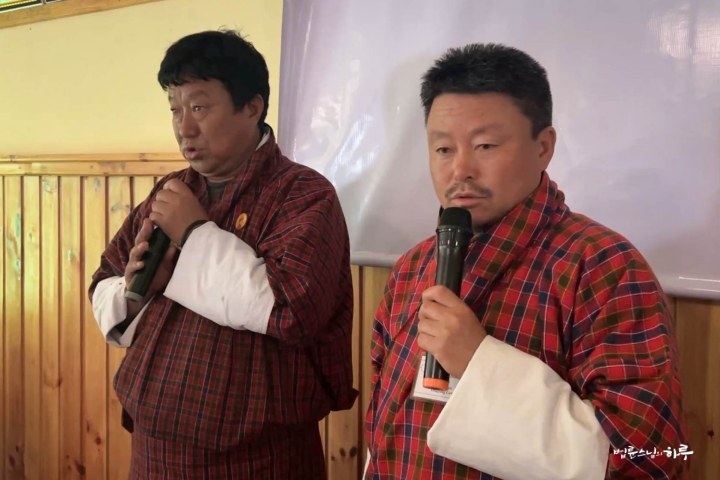
All participants joined their hands together and chanted along. Sunim also joined his palms and listened to the sound, gathering his mind. The participants’ chanting was magnificent.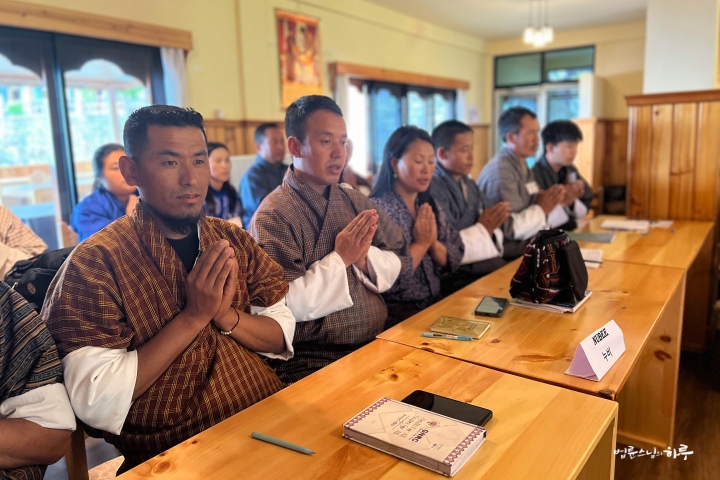
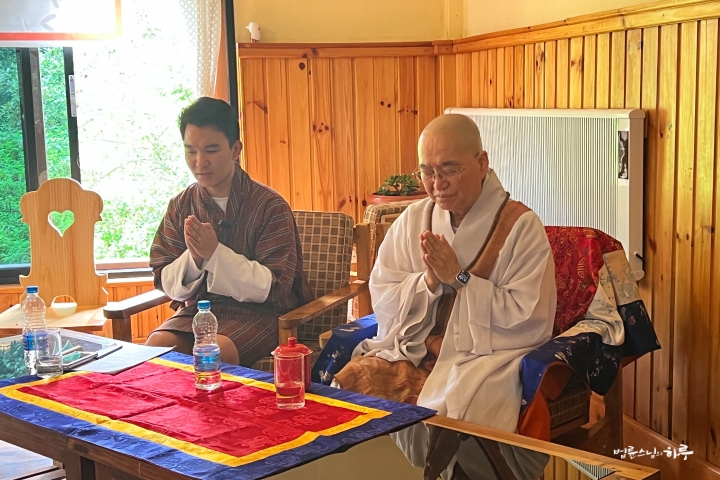
After the chanting ended, Sunim emphasized once again what mindset should guide the project.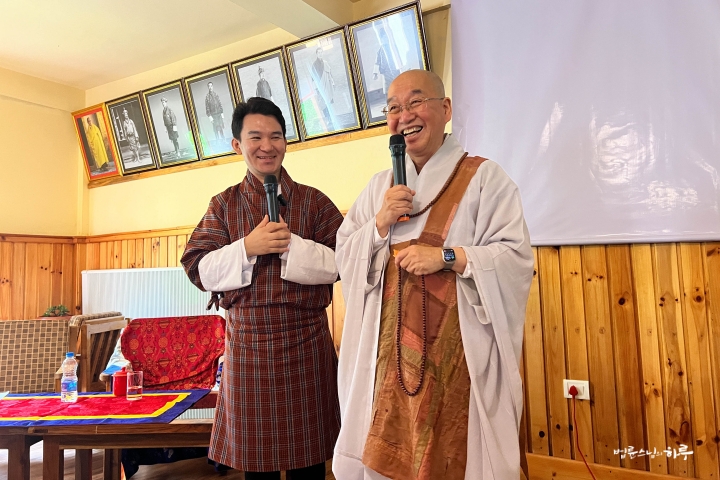
This Buddhist Service Is About Saving Many Sentient Beings from Suffering
“We are conducting a great Buddhist service in Trongsa. This service is about saving many beings from suffering, and it has even greater meaning than just erecting large Buddha statues or building temples. Let us proceed with this service with earnest hearts, hoping that this aspiration will surely be fulfilled, while offering chants and prayers together. Let us also remember the grace of His Majesty the King, who made it possible for us to walk this path together by creating the nation of Bhutan. I am grateful for all these connections.”
Sunim then distributed the gifts he had prepared.
“Since I came directly from Japan, I prepared towels in Bangkok. I couldn’t print workshop commemorative messages on them. I’m sorry. Instead, please engrave ‘workshop commemoration’ in your hearts. The travel toothpaste and toothbrushes are from Korea. These prayer beads are what I received from Bodh Gaya. I’m going to place these beads around your necks now, and from the moment you receive them, you become Bodhisattvas. From now on, please proceed with this Buddhist service with your best efforts without any complaints.” (laughter)
Sunim personally placed the prayer beads around each person’s neck.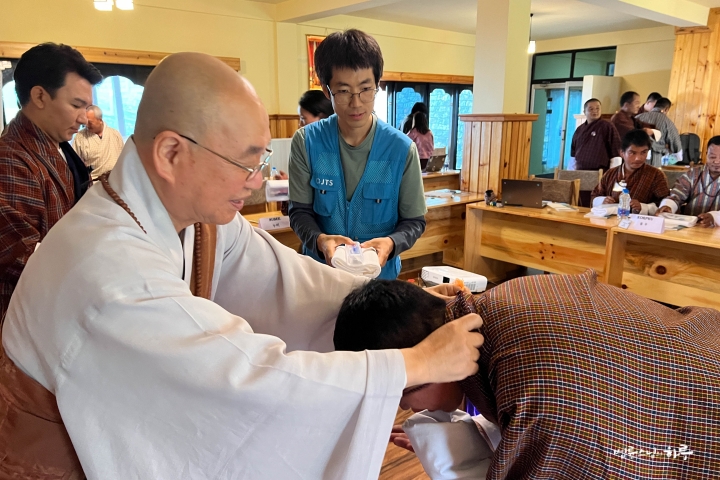
After the gift presentation, they went outside the building to take a group photo and concluded the workshop.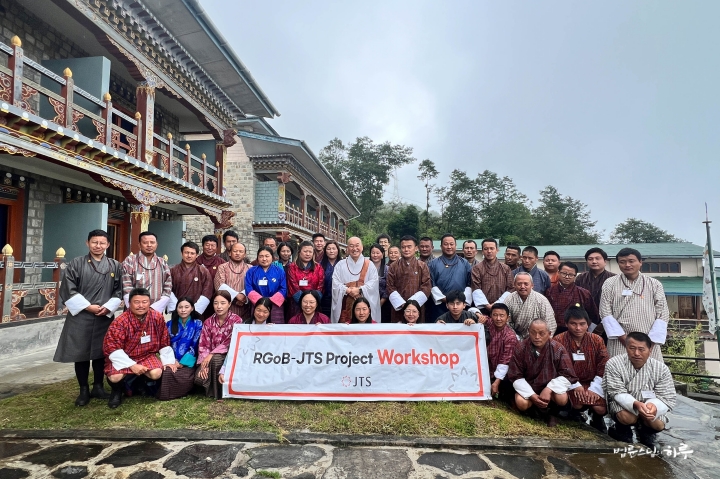
After lunch and saying goodbye to the accommodation staff who had worked hard, they departed for Zhemgang at 1:10 PM for the next workshop. The civil servants from Trongsa Dzongkhag saw Sunim off.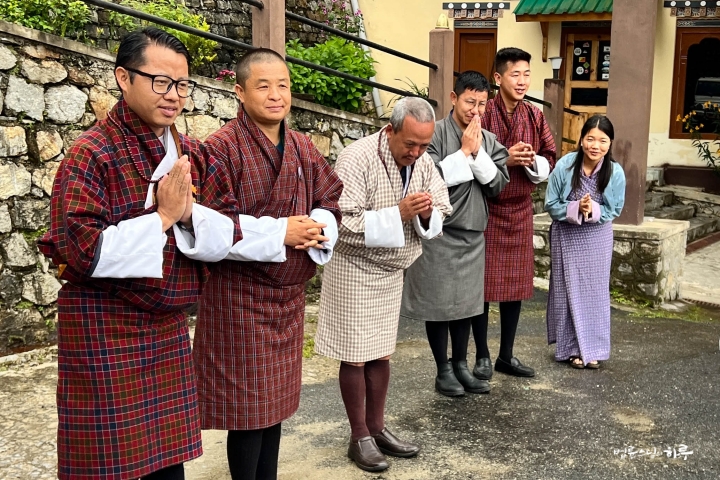
After driving for over three hours through winding, foggy roads, they arrived at Zhemgang Royal Guest House at 3:50 PM.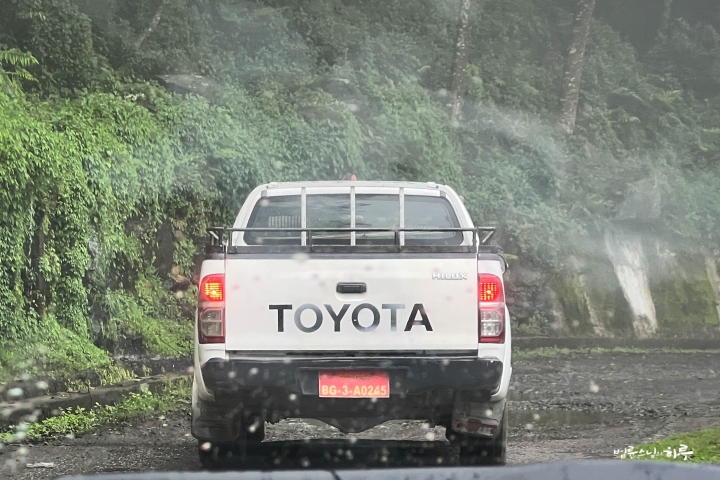
At Zhemgang Royal Guest House, the planning officer and agriculture officer overseeing the Zhemgang regional workshop were waiting for Sunim. After sharing tea and exchanging greetings, Sunim unpacked at the accommodation and worked on manuscript editing.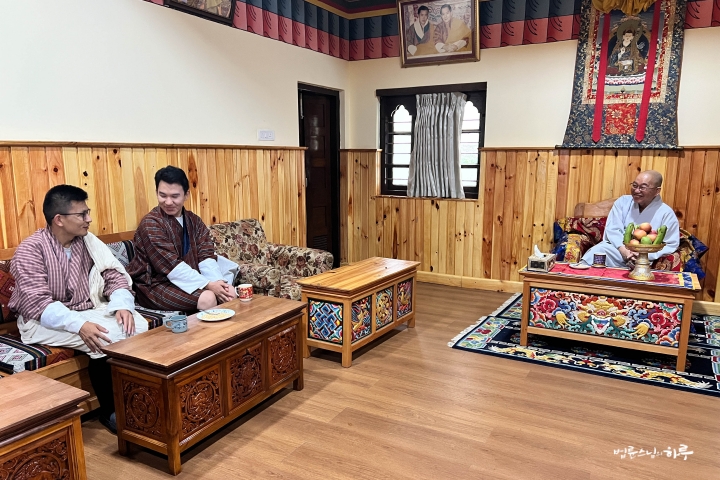
At 7 PM, the Zhemgang Dzongdag came to the accommodation to meet Sunim. They had a serious conversation on various topics including tourism development in Zhemgang, civil service operations, and difficulties in attracting foreign tourists. Finally, the Dzongdag asked.
“How can a small country like Bhutan survive between China and India?”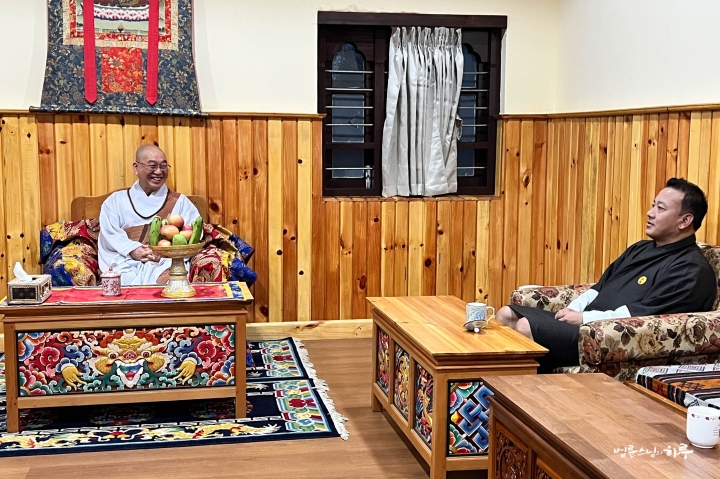
Sunim responded.
Between China and India: Bhutan’s Realistic Diplomatic Solution
“Currently, Bhutan is not maintaining a neutral position between China and India, but has clearly positioned itself on India’s side. However, that doesn’t mean Bhutan needs to be hostile toward China. From China’s perspective, there’s a possibility they might dislike Bhutan even more than India. If that happens, Bhutan could be directly attacked. The realistic choice is to side with one while maintaining a friendly attitude toward the other, asking for their understanding.
“It’s true that Bhutan is close to India both geographically and historically. However, being close to India doesn’t mean being hostile to China. From China’s perspective, seeing the close relationship between Bhutan and India, they might misunderstand that Bhutan is trying to distance itself from or pressure China. Although Bhutan has no such intention at all.”
“Korea is in a similar position between China and the United States. When relations with China were good, we benefited considerably by focusing security on the U.S. and economy on China. However, as the conflict between China and the U.S. has intensified recently, Korea’s position has become increasingly difficult. Japan has relatively clearly sided with the United States, but Korea cannot act like Japan. We’re geographically closer to China, and the more Korea leans toward the U.S., the more likely North Korea will lean toward China. That would make unification even more difficult. In this situation, the U.S. suspects Korea might lean toward China, while China complains that Korea makes money in their country while following America’s position.
Meanwhile, our country’s politics remains divided rather than unified. The so-called conservative forces value the alliance with the United States and relatively oppose China. On the other hand, progressive forces try to maintain friendly relations with China as much as possible. During the Yoon Suk-yeol administration, we completely leaned toward the United States, resulting in intensified conflict with China. We don’t need to take the initiative to publicly oppose China like this. We need diplomacy that seeks China’s understanding about our unavoidable position in our relationship with the United States, our long-time ally. Even if we decide to side with the United States.
Korea’s Diplomacy Between the U.S. and China: Why Pragmatism and Caution Are Needed
However, the previous administration took the initiative to oppose China. So from China’s perspective, it was annoying. The diplomatic policy was somewhat misguided. When the progressive government came back to power, now the United States is suspicious. ‘Are they perhaps colluding with China? Is there some connection with North Korea?’ Like this. In fact, from Korea’s position, it’s necessary to maintain friendly relations with both China and North Korea, but the United States always suspects this. That’s why I tell officials of Korea’s new government not to rush to improve relations with North Korea. Since the United States is suspicious now, there’s no need to unnecessarily invite suspicion.
If there’s an opportunity to meet President Trump, we should say, ‘Only you can solve the Korean Peninsula issue. We’ll help, so please resolve the relationship with North Korea.’ We shouldn’t step forward saying, ‘We’ll mediate between the United States and North Korea.’ President Trump is someone who likes to say he accomplishes things others cannot. So to persuade him, we should say something like, ‘It’s been 72 years since the Korean War ended, but the war hasn’t really ended yet, and only you can end it.’
The previous administration actually worsened inter-Korean relations, and the new administration wants to achieve results in inter-Korean relations in the opposite way. But now is not the time. It’s more advantageous to put the United States at the forefront while we coordinate from behind. Diplomacy should be essentially pragmatic. If we lean toward ideology, we lose practical benefits. But looking at actual diplomatic scenes, diplomacy is often used to secure advantageous positions in domestic politics rather than for national interests. The mistake is made where the entire nation’s interests are sacrificed for individual political gains.
President Trump also uses the strategy of constantly highlighting immigrant issues within the United States, creating enemies to control the internal situation. Putin also strengthened his power through war, and Ukraine’s Zelensky and Israel’s Netanyahu tend to maintain their political positions through war because their power could be shaken without war. On the surface, everyone claims national interests, but in reality, private interests in maintaining power are at work. Bhutan could also potentially split into pro-China and pro-India factions if not careful. Nepal is actually like that.” (laughter)
Concluding the conversation, Sunim presented the governor with an English edition of “Revolutionary Buddha” and prayer beads from Bodh Gaya as gifts.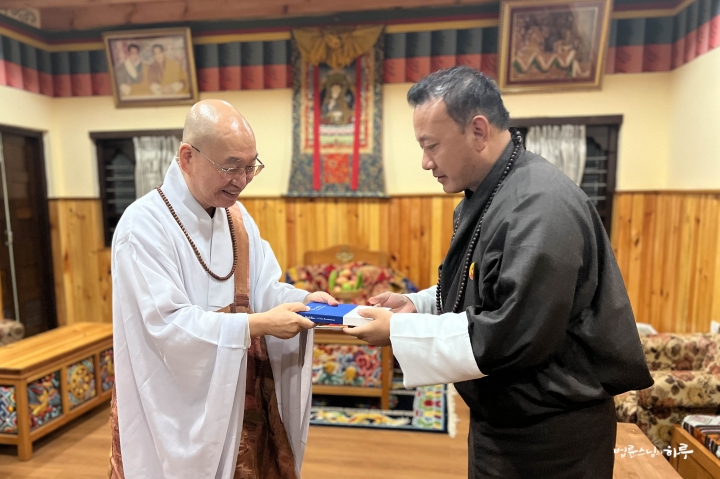
After seeing off the governor, the day concluded at 9 PM.
Tomorrow, Sunim will conduct a sustainable development workshop all day with civil servants and village representatives from the Zhemgang region.





